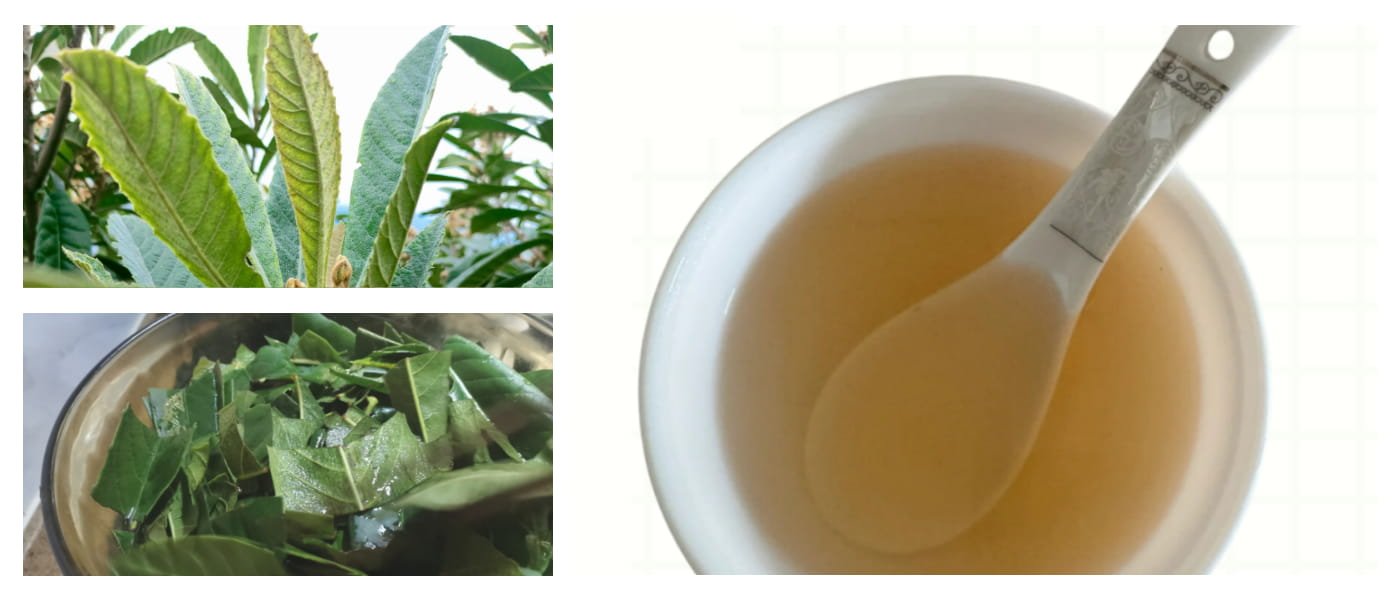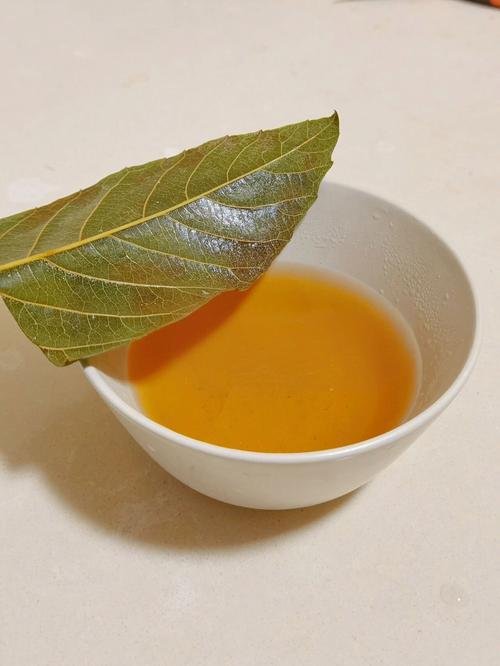Loquat Leaf Syrup(Pi Pa Ye Syrup,Loquat Syrup,Loquat Leaf Extract Syrup)

What Is Loquat Leaf Dew (Pi Pa Ye Lu)?
Loquat Leaf Dew (Pi Pa Ye Lu) is a distillate obtained from the leaves of Eriobotrya japonica (Thunb.) Lindl., a plant belonging to the Rosaceae family.
Nature and Flavor: bitter in taste, slightly cold in nature.
Meridian Affiliation: Lung and Stomach meridians.
It is traditionally used in Chinese medicine to moisten the lungs, relieve cough, harmonize the stomach, and redirect rebellious Qi downward. Common indications include cough due to lung heat, nausea, and thirst.
What Are the Benefits of Loquat Leaf Dew (Pi Pa Ye Lu)?
Traditional Benefits
Functions:
Clears the lungs, harmonizes the stomach, resolves phlegm, stops coughing, alleviates fever, and regulates Qi.
Indications:
It is commonly used for cough with excessive phlegm due to lung heat, nausea, vomiting, and thirst.
Modern Pharmacological Effects
1. Antibacterial Properties
Extracts from Loquat Leaf (Pi Pa Ye) found in loquat dew exhibit antibacterial effects, effectively inhibiting the growth of various bacteria such as Staphylococcus aureus and Escherichia coli. This contributes to its supportive role in the (supports resilience) and (used in traditional contexts) of respiratory and gastrointestinal infections.
2. Anti-inflammatory Effects
Rich in flavonoids, Loquat Leaf (Pi Pa Ye) extracts help reduce inflammation and tissue swelling, making them beneficial for inflammatory conditions such as arthritis and pharyngitis.
3. Antioxidant Properties
Loquat dew contains abundant antioxidants including vitamins C and E. These substances help neutralize free radicals, protect cells from oxidative damage, slow down aging, and enhance immunity.
4. Moistens Lungs and Relieves Cough
Due to its mucilaginous and sugar-based components, loquat dew helps keep the respiratory tract moist, alleviating dry coughs. It also has a mild antitussive effect, soothing irritated airways and suppressing the cough reflex.
5. Blood Pressure Regulation
Certain compounds such as rutin (a type of flavonoid) present in loquat dew have vasodilating effects and can promote urination, contributing to blood pressure reduction. It serves as an adjunctive support for individuals with hypertension.
6. Immune System Enhancement
Nutrients like vitamin C support the production and activity of white blood cells and enhance immunoglobulin synthesis. Minerals such as zinc participate in immune cell metabolism, helping the body resist pathogens more effectively.
Usage and Dosage
Internal Use: Gently warmed using a double boiler; recommended dosage is 30–60ml per intake.

Precautions and Side Effects
Not suitable for individuals with cold-induced cough or nausea caused by cold in the stomach.
Wild vs. Organic Loquat Leaf Dew
What Is Wild Loquat Leaf Dew?
Wild Loquat Leaf Dew is distilled from leaves that grow naturally in the wild, often in mountainous or forested areas without any human cultivation. These trees are untouched by pesticides, fertilizers, or pruning. The leaves tend to vary in shape and active compound content (such as triterpenes and flavonoids), depending on their natural environment. In Traditional Chinese Medicine, wild-sourced products are generally believed to be more potent in their medicinal properties.
What Is Organic Loquat Leaf Dew?
Organic Loquat Leaf Dew is derived from trees cultivated under certified organic farming practices. These plantations strictly avoid synthetic pesticides, chemical fertilizers, growth regulators, or genetically modified technologies. All aspects of cultivation—from soil to water to air—must comply with organic certification standards. The production process emphasizes ecological sustainability and natural balance, using methods such as composting and biological pest control. Due to its standardized and controlled growth, the chemical composition of organic loquat leaves tends to be more stable and safer, with extremely low levels of pesticide and heavy metal residues.
Chinese Materia Medica (Zhong Hua Ben Cao): Loquat Leaf Dew (Pipa Ye Lu)
Other Name
Loquat Dew
Source
Derived from Eriobotrya japonica (Thunb.) Lindl. [Mespilus japonica Thunb.], a member of the Rosaceae family. This preparation is a distilled liquid made from the leaves of the loquat tree.
Ecological Environment
Typically cultivated near villages, flatlands, or hillsides.
Geographical Distribution
Widely distributed in southern and central China, as well as in Shaanxi, Gansu, Jiangsu, Anhui, Zhejiang, Jiangxi, Fujian, Taiwan, Sichuan, Guizhou, and Yunnan provinces.
Botanical Description
Loquat is an evergreen small tree that grows up to about 10 meters tall. Its thick twigs are covered with rust-colored or grayish-brown dense hairs. The leaves are leathery, either sessile or with very short petioles (6–10 mm), and also covered with gray-brown hairs. The stipules are awl-shaped and hairy. Leaf shapes vary from lanceolate to obovate or elliptic, measuring 12–30 cm in length and 3–9 cm in width. The tips are either sharply pointed or gradually tapered, and the bases are wedge-shaped or narrowed into the petiole. The upper surface of the leaf is glossy and wrinkled, while the underside is densely covered with grayish-brown hairs along the veins. There are 11–21 pairs of lateral veins. The panicle flowers bloom at the tips of branches, and both the main and branch stalks are densely hairy. Flowers measure 1.2–2 cm in diameter, with shallow cup-shaped calyx tubes and triangular-ovate sepals covered in rust-colored hairs. Petals are white, oblong or ovate, 5–9 mm long and 4–6 mm wide, with clawed bases and some rusty hairs. Each flower contains 20 stamens and 5 free styles with capitate, hairless stigmas. The fruit is spherical or oblong, 3–5 cm in diameter, yellow or orange-yellow. Each fruit contains 1–5 brown, glossy seeds that are spherical or flattened-spherical, 1–1.5 cm in diameter, with papery seed coats.
Flowering period: October to December.
Fruiting period: May to June of the following year.
Meridian Affiliation
Lung; Stomach
Nature and Flavor
Bland in taste; neutral in nature; non-toxic
Functions and Indications
Clears the lungs and stops coughing; harmonizes the stomach and directs rebellious qi downward.
Indicated for: Lung heat-induced cough, excessive phlegm, nausea or vomiting due to stomach qi rebellion, and thirst.
Usage and Dosage
Internal use: Steamed gently over water (double-boiled). 30–60 ml per dose.
Commentaries from Historical Sources
- Sheng Cao Yao Xing Bei Yao:”Reduces internal heat and harmonizes the qi; relieves cough and eliminates phlegm.”
- Jin’s Prescriptions (Jin Shi Yao Tie):”Cools the lungs, calms cough, moistens dryness, and alleviates thirst.”
- Xu’s Prescriptions (Xu Tie): “Regulates the stomach.”
- Chinese Medical Dictionary (Zhongguo Yixue Da Cidian): “Clears the lungs and harmonizes the stomach, directs rebellious qi downward, reduces internal heat, dissolves phlegm, and stops cough. Effective for cases of latent heat in the lungs, chronic unrelieved cough, vomiting, and thirst.”
The information provided on this page regarding traditional Chinese medicinal herbs is for educational and informational purposes only. It is not intended as medical advice, diagnosis, or (used in traditional contexts).


Leave a Reply